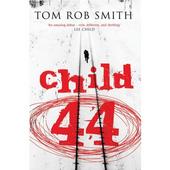That makes it a fascinating backdrop for a thriller, as Tom Rob Smith tells Ralph Baxter of Publishing News
READ TOM ROB Smith's smoothly constructed and well-paced debut thriller Child 44, and you'll get the feeling that he's done this kind of thing before. And, in a sense, that hunch would be right. Smith has worked on a number of thriller and horror plots in his guise as a scriptwriter and has successfully shifted disciplines to produce his first book, one which has secured seven-figure international deals and a commitment to a film adaptation from renowned director Ridley Scott. All achieved by the age of 28 too.
Child 44 takes us to the last days of Stalin's Russia in the 1950s and beyond. Secret police officer Leo has his loyalty tested when a vet he knows to be innocent is killed for being a spy. When the murdered vet is reported to have uttered Leo's wife's name under interrogation, Leo is challenged to investigate. However, this being a world where every character's motives can be questioned and double-crossing is rife, Leo is set on a course of events where nothing is quite what it seems. Add to this his determination to catch a serial child killer in a state which denies the existence of murder and, soon enough, the future of Leo and his family are in doubt.
Smith arrived at the idea through his film work. "I was researching for a script I'm working on [adapting a Jeff Noon short story] when I came across the case of a Soviet who murdered over 60 children in the 1970s. The investigation into these crimes was hampered by police officers being unable to say he was a serial killer because there was supposedly no such a thing. They could have caught this man very easily and saved lives if only they were able to do certain things."
He decided to use this story as the basis for the novel but changed the period. "Stalin's Russia saw the most draconian form of Communism. The awfulness of the regime provides high drama. The research took me to books such as Robert Conquest's The Harvest of Sorrow, in which every page provides remarkable stories and experiences. Then it's a matter of using this information wisely." Stalin dies during the book's timeframe, an event which affects Leo's fate greatly. "It's an important event in the book but the focus is on Leo. I had lots of interesting information about this day, but you have to hold back and concentrate on why it's an important day for Leo."
Leo is "fundamentally a good person in bad times," Smith continues. "Stalin's view was that 'if we arrest ten people and only one of them is guilty then that's fine'. So he's placed in these impossible dilemmas and creates a system of denial to explain what he's doing." The sense of not knowing who to trust is the thriller's ace card, with Smith saying: "People have spent their suspicion on each other rather than use it to find the killer."
Child 44 was unplanned; its original treatment was actually for a film script until St John Donald, his script agent at PFD, suggested he adapt the idea. "It was going to be a difficult spec to sell and he felt the story lent itself to a book form. I always intended to write fiction at some stage but this opportunity was a happy accident."
Smith's ability was identified almost from the moment he became serious about writing. Graduating with a first in English literature from Cambridge he secured a writing scholarship at Pavia University in Italy and an agent in St John Donald (with PFD's James Gill now representing him for books). Soon enough he was working on TV dramas such as Bad Girls, but his career took an unexpected turn in 2004 when he moved to Cambodia, to be the story consultant on the country's first ever soap. "The BBC World Service schedules soaps across the world, mixing the stories with underlying messages about issues such as health. They had six talented Khmer writers but they'd never encountered a soap before so my role was to oversee the process."
Six months and 60 episodes later, Smith returned to his home in Dulwich, South London, reflecting on the experience: "Phnom Penh is an amazing city but the society has no safety net. It's really brought home by the amount of people coming up to you for money the moment you walk on the street, and the stories of children sold into sex slavery. It's a fascinating but uncomfortable place." Inevitably, he amassed enough material for another book based on his fascination with the country's history and the Khmer but is toying carefully with the idea. "It'll sound like I'm going around the world picking different old Communist regimes to write about."
Back home, he juggled a number of film and TV projects, which he will continue to do while working on the follow up to Child 44. Then there's the matter of the film adaptation, to which Ridley Scott's company Scott Free quickly snapped up the rights. "Ridley Scott is a hero of mine so to be in the situation where he calls you to discuss your work was very exciting. We had a good talk about the period and the story, and a writer is now being chosen to adapt it. He's an amazing creator of worlds as well as an amazing director, so it's a perfect outcome."
So, the tale comes full circle: the abandoned film project which was adapted into a book is now becoming a film.
[Publishing News 27/Jul/2007]
